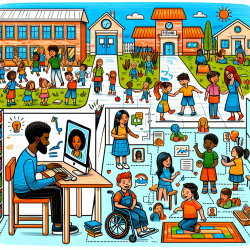Enhancing Therapy for Refugee Children: Key Insights from Recent Research
In the realm of speech-language pathology and therapy for children, understanding the unique needs of refugee children is paramount. The recent systematic review titled Understanding Supporting and Hindering Factors in Community-Based Psychotherapy for Refugees: A Realist-Informed Systematic Review provides valuable insights that can enhance therapeutic outcomes for refugee children.
Key Findings and Their Implications
The research highlights several factors that influence the success of community-based psychotherapy for refugees, which can be particularly relevant for practitioners working with refugee children:
- Culturally Adapted Care: Providing therapy in a culturally sensitive manner is crucial. This involves understanding and integrating cultural norms and values into therapy sessions, which can significantly improve engagement and outcomes.
- Migrant-Sensitive Settings: Therapy should be conducted in environments that are welcoming and accessible to refugees. This reduces barriers to access and helps in building trust with the children and their families.
- Task-Shifting: Involving non-specialist staff in delivering therapy can enhance service delivery. Training teachers or community workers to support therapy sessions can make interventions more sustainable and widespread.
- Intensity of Intervention: The frequency and duration of therapy sessions are critical. Ensuring that sessions are sufficiently intensive can lead to better mental health outcomes.
Challenges and Considerations
While the study presents promising strategies, it also identifies challenges that practitioners should be mindful of:
- Socio-Cultural Differences: Practitioners must be aware of diverse cultural expressions and coping mechanisms. Tailoring interventions to fit these differences is essential for effectiveness.
- Insecure Asylum Status: The precarious legal status of many refugees can exacerbate mental health issues. Practitioners should advocate for stable environments to facilitate better therapeutic outcomes.
Practical Steps for Practitioners
To implement these findings, practitioners can take the following steps:
- Engage in cultural competency training to better understand the backgrounds of refugee children.
- Collaborate with community organizations to create supportive environments for therapy.
- Advocate for policies that provide legal stability for refugee families, as this can significantly impact mental health.
- Consider task-shifting strategies to involve community members in therapy delivery, thereby expanding reach and impact.
By integrating these insights into practice, therapists can significantly enhance the effectiveness of their interventions for refugee children, ultimately leading to better mental health outcomes.
To read the original research paper, please follow this link: Understanding Supporting and Hindering Factors in Community-Based Psychotherapy for Refugees: A Realist-Informed Systematic Review.










